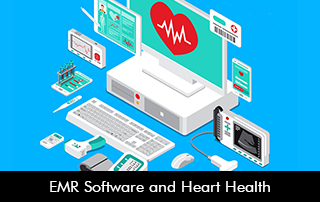To improve heart health cardiologists require spot-on analysis of data from different sources such as lab tests, cardiac imaging, and physical examination. They have implemented Electronic Medical Records (EMR) Software Systems to assist heart health or cardiology practices. Cardiology EHR Software has robust functionalities to streamline workflows, enhance patient care, and manage cardiology patient information.
Heart Diseases in the USA
- An estimated 695,000 people die of heart disease in America.
- Coronary heart disease is the most common type of heart disease that takes lives.
- 159,000 Americans die of stroke annually.
Improved Heart Health with Cardiology EMR Software Tools
When practices utilize a cardiology electronic medical records software they can drastically enhance the heart health of patients and even boost health outcomes. The functionalities in Cardiology Electronic Health Records (EHR) Software are customized to meet the unique requirements of heart health.
Specialty Specific Templates
Cardiology software has built-in templates tailored for cardiology and heart care. These include ICDs, cardiology SOAP notes, pacemaker visits, and hypertension. This can help cardiologists record particular information pertinent to their practice and streamline documentation.
Diagnostic Tools Integration
The robust technology solution frequently integrates with a variety of diagnostic devices and machines. This allows for the direct input of test results such as electrocardiograms (ECGs), imaging studies, and other data.
Cardiovascular Patient Information
Cardiologists can use the EMR System to record and preserve detailed patient information such as medical history, medications, allergies, diagnostic test results (such as EKGs, echocardiograms, and stress tests), and treatment plans.
Cardiology Dashboard
The cardiology dashboard feature in the EHR Software helps physicians view patient charts, profiles, and data related to scheduling and billing in one place. This saves time as the healthcare provider doesn’t have to switch between screens to view different patient information. The Swift availability of critical patient data bolsters work productivity and allows cardiologists to concentrate on patient care.
Interoperability
The robust interoperability options in electronic health records software facilitate the seamless exchange of patient data between different systems and specialists. This leads to care collaboration which is the building block to providing high-quality patient care. When an interoperable environment is created fragments in care are reduced.
Telemedicine Integration in EMR Software for Better Heart Health and Chronic Disease Management
Remote care helps to extend patient care access and this is typically important for patients suffering from different heart ailments. Patients can easily schedule telemedicine software sessions from the convenience of their homes. This enables providers to monitor patient conditions virtually. Cardiologists can identify any potential red flags during the virtual session and guide them further.
Telemedicine integration in Electronic Medical Records (EMR) Software gives both clinicians and patients the flexibility they need in care and even ensures accurate medication management.







